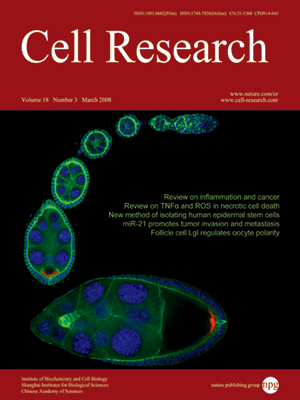
Volume 18, No 3, Mar 2008
ISSN: 1001-0602
EISSN: 1748-7838 2018
impact factor 17.848*
(Clarivate Analytics, 2019)
Volume 18 Issue 3, March 2008: 422-432
ORIGINAL ARTICLES
Ethylene signaling is required for the acceleration of cell death induced by the activation of AtMEK5 in Arabidopsis
Hongxia Liu*, Ying Wang*, Juan Xu, Tongbing Su, Guoqin Liu and Dongtao Ren
State Key Laboratory of Plant Physiology and Biochemistry, College of Biological Sciences, China Agricultural University, Beijing 100094, China
Correspondence: Dongtao Ren(ren@cau.edu.cn)
Mitogen-activated protein kinases (MAPKs) are involved in the regulation of plant growth, development and responses to a wide variety of stimuli. In a conditional gain-of-function transgenic system, the activation of AtMEK5, a MAPK kinase, can in turn activate endogenous AtMAPK3 and AtMAPK6, and can lead to a striking increase in ethylene production and induce hypersensitive response (HR)-like cell death in
Arabidopsis. However, the role of the increased ethylene production in regulating this HR-like cell death remains unknown. Using
Arabidopsis transgenic plants that express AtMEK5
DD, an active mutant of AtMEK5 that is under the control of a steroid-inducible promoter, we tested the contribution of ethylene to cell death. We found that ethylene biosynthesis occurs before cell death. Cell death was delayed by inhibiting AtMEK5-induced ethylene production using inhibitors of ACC-synthases, ACC-oxidases or ethylene receptors. In the mutants
AtMEK5DD/etr1-1 and
AtMEK5DD/ein2-1, both of which showed insensitivity to ethylene, the expression of AtMEK5
DD protein, activity of AtMAPK3 and AtMAPK6, and ethylene production were the same as those seen in
AtMEK5DD transgenic plants, but cell death was also delayed. These data suggest that ethylene signaling perception is required to accelerate cell death that is induced by AtMEK5 activation.
Cell Research (2008) 18:422-432. doi: 10.1038/cr.2008.29; published online 12 February 2008
FULL TEXT | PDF
Browse 2013


